Fleurs du Mal Magazine


Or see the index
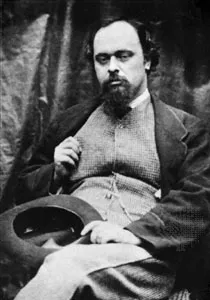
Insomnia
Thin are the night-skirts left behind
By daybreak hours that onward creep,
And thin, alas! the shred of sleep
That wavers with the spirit’s wind:
But in half-dreams that shift and roll
And still remember and forget,
My soul this hour has drawn your soul
A little nearer yet.
Our lives, most dear, are never near,
Our thoughts are never far apart,
Though all that draws us heart to heart
Seems fainter now and now more clear.
To-night Love claims his full control,
And with desire and with regret
My soul this hour has drawn your soul
A little nearer yet.
Is there a home where heavy earth
Melts to bright air that breathes no pain,
Where water leaves no thirst again
And springing fire is Love’s new birth?
If faith long bound to one true goal
May there at length its hope beget,
My soul that hour shall draw your soul
For ever nearer yet.
Dante Gabriel Rossetti
(1828 – 1882)
Insomnia
• fleursdumal.nl magazine
More in: #Editors Choice Archiv, *The Pre-Raphaelites Archive, Archive Q-R, Archive Q-R, Rossetti, Dante Gabriel
major exhibition devoted to
the radical Rossetti generation
in Tate Britain
from 6 April until 24 September 2023
This exhibition follows the romance and radicalism of the Rossetti generation, through and beyond the Pre-Raphaelite years: Dante Gabriel, Christina and Elizabeth (née Siddal). Visitors will get to experience world-renowned works from their boundary-pushing careers.
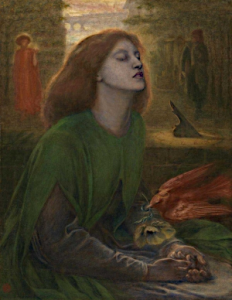 The Rossettis’ approach to art, love and lifestyles are considered revolutionary, and this will be thoroughly explored in an immersive show, using spoken poetry, drawings, paintings, photography, design and more.
The Rossettis’ approach to art, love and lifestyles are considered revolutionary, and this will be thoroughly explored in an immersive show, using spoken poetry, drawings, paintings, photography, design and more.
This is the first retrospective of Dante Gabriel Rossetti at Tate and the largest exhibition of his iconic pictures in two decades.
It will also be the most comprehensive exhibition of Elizabeth Siddal’s work for 30 years, featuring rare surviving watercolours and important drawings.
The Rossettis will take a fresh look at the fascinating myths surrounding the unconventional relationships between Dante Gabriel Rossetti, Elizabeth Siddal, Fanny Cornforth and Jane Morris.
The Rossettis exhibition book
by Carol Jacobi and James Finch
hardback
Dimensions 27.5 x 23 cm
Material FSC certified paper and card
ISBN 9781849768412
£40
This visually captivating hardback exhibition book is devoted to the radical Rossetti generation.
Explore the Rossettis’ revolutionary approach to art, love and lifestyles through a collection of thematic essays containing fresh and surprising research, accompanied by beautiful Pre-Raphaelite illustrations.
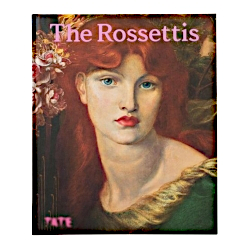 The Rossettis takes a fresh look at the fascinating myths surrounding the unconventional relationships between Dante Gabriel Rossetti, Elizabeth Siddal, Fanny Cornforth and Jane Morris. Featuring artworks and writings by Dante Gabriel, Christina and Elizabeth (née Siddal), the book distinguishes the Rossettis and foregrounds their countercultural roles.
The Rossettis takes a fresh look at the fascinating myths surrounding the unconventional relationships between Dante Gabriel Rossetti, Elizabeth Siddal, Fanny Cornforth and Jane Morris. Featuring artworks and writings by Dante Gabriel, Christina and Elizabeth (née Siddal), the book distinguishes the Rossettis and foregrounds their countercultural roles.
The catalogue accompanies the first retrospective of Dante Gabriel Rossetti at Tate and the largest exhibition of his iconic pictures in two decades, and what will also be the most comprehensive exhibition of Elizabeth Siddal’s work for 30 years, featuring rare surviving watercolours and important drawings.
The publication is edited by Carol Jacobi, Curator, British Art 1850—1915 at Tate and James Finch, Assistant Curator, Nineteenth Century Art at Tate. It features contributions by:
– Chiedza Mhondoro, Assistant Curator, Historic British Art at Tate – Dinah Roe, Reader in Nineteenth Century Literature at Oxford Brookes University – Glenda Youde, a writer and researcher based at University of York – Liz Prettejohn, Professor of Art History at University of York – Jan Marsh, a writer, curator and specialist in the Pre-Raphaelite period – Gursimran Oberoi, an associate teaching fellow at University of Surrey – Margaretta S. Frederick, the former Annette Woolard-Provine Curator of the Bancroft Collection of Pre-Raphaelite Art at Delaware Art Museum – Wendy Parkins, Professor of Victorian Literature and the Director of the Centre for Victorian Literature and Culture at the University of Kent
• fleursdumal.nl magazine
More in: *The Pre-Raphaelites Archive, - Book News, - Bookstores, Archive Q-R, Archive Q-R, Art & Literature News, Exhibition Archive, FDM in London, History of Britain, Illustrators, Illustration, Morris, William, Rossetti, Christina, Rossetti, Dante Gabriel, Siddal, Lizzy
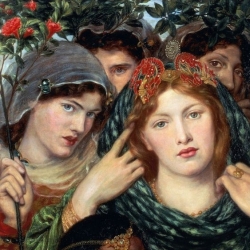
A New-Year’s Burden
Along the grass sweet airs are blown
Our way this day in Spring.
Of all the songs that we have known
Now which one shall we sing?
Not that, my love, ah no!—
Not this, my love? why, so!—
Yet both were ours, but hours will come and go.
The grove is all a pale frail mist,
The new year sucks the sun.
Of all the kisses that we kissed
Now which shall be the one?
Not that my love, ah no!—
Not this, my love?—heigh-ho
For all the sweets that all the winds can blow!
The branches cross above our eyes,
The skies are in a net:
And what’s the thing beneath the skies
We two would most forget?
Not birth, my love, no, no,—
Not death, my love, no, no,—
The love once ours, but ours long hours ago.
Dante Gabriel Rossetti
(1828 – 1882)
A New-Year’s Burden
• fleursdumal.nl magazine
More in: *The Pre-Raphaelites Archive, Archive Q-R, Archive Q-R, Lizzy Siddal, Rossetti, Dante Gabriel
De kunstenaar en zijn muze: liefde, begeerte, desillusie en onontkoombare verbondenheid
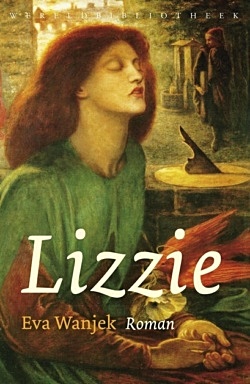 Een onconventionele relatie tussen twee bijzondere mensen leidt hen naar de toppen van de roem, maar ook naar afgronden van ellende en vertwijfeling: van drank, opium en vooral wederzijdse afhankelijkheid. Het is de symbiotische relatie van een gedreven kunstenaar die alles – ook zijn eigen geluk en dat van anderen – opoffert voor de kunst, en een vrouw die haar bestaansrecht ontleent aan haar uitzonderlijke schoonheid, terwijl ze faalt in haar eigen artistieke ambities.
Een onconventionele relatie tussen twee bijzondere mensen leidt hen naar de toppen van de roem, maar ook naar afgronden van ellende en vertwijfeling: van drank, opium en vooral wederzijdse afhankelijkheid. Het is de symbiotische relatie van een gedreven kunstenaar die alles – ook zijn eigen geluk en dat van anderen – opoffert voor de kunst, en een vrouw die haar bestaansrecht ontleent aan haar uitzonderlijke schoonheid, terwijl ze faalt in haar eigen artistieke ambities.
Lizzie geeft een levendig en panoramisch beeld van het bruisende Londen van de 19de eeuw, met zijn culturele elite, zijn bohémiens en zijn zelfkant. Hij biedt zowel kostuumdrama en ‘Gothic horror’ als erotische en indringende psychologische scènes. Het is een groots opgezet drama, van de allereerste ontmoeting in 1849 tussen het onbekende naaistertje en het aanstormende genie, tot aan diens dood als beroemde, maar eenzame weduwnaar in 1882.
Lizzie is een boeiende roman, die alle facetten van een man-vrouwrelatie toont, van prille liefde en begeerte, via wederzijdse ontrouw, vervreemding en desillusie tot aan het besef van absolute lotsverbondenheid.
Eva Wanjek is het pseudoniem waaronder twee auteurs van Uitgeverij Wereldbibliotheek hun krachten hebben gebundeld: de romanschrijver Martin Michael Driessen en de dichteres Liesbeth Lagemaat.
De pers over Lizzie:
‘Een samenwerkingsverband tussen Martin Michael Driessen en Liesbeth Lagemaat leidt tot een historische roman waarin kunstzinnige verhevenheid en de liefde het pijnlijk afleggen tegen de zelfdestructie. ****’ NRC Handelsblad
‘De auteurs hebben dit tranentrekkende, vuistdikke verhaal schittering opgebouwd. beelden trekken als een film aan je voorbij en laten je niet los. En al ben je broodnuchter, raak je door hun liefdesgeschiedenis die gedoemd is te mislukken, bedwelmd, en leest die in één gelukzalige roes uit.’ Baarnsche Courant
Een fragment uit: ‘Lizzie’
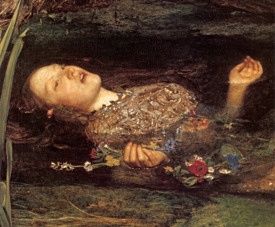 En als Miss Siddall maar lang genoeg in dit water ligt terwijl ik schilder, en vergeet waar ze is, dan krijg ik misschien juist de uitdrukking die ik zoek. Die van vergetelheid, van opgave, alsof ze op de wateren van de Lethe drijft. Misschien helpt een beetje laudanum. En ze is mooi genoeg om ook dan nog begeerlijk te zijn. Want dat is waarom het gaat. Ophelia moet in haar dood begeerlijk zijn. Want alleen dan is het tragisch dat niemand haar ooit zal beminnen.
En als Miss Siddall maar lang genoeg in dit water ligt terwijl ik schilder, en vergeet waar ze is, dan krijg ik misschien juist de uitdrukking die ik zoek. Die van vergetelheid, van opgave, alsof ze op de wateren van de Lethe drijft. Misschien helpt een beetje laudanum. En ze is mooi genoeg om ook dan nog begeerlijk te zijn. Want dat is waarom het gaat. Ophelia moet in haar dood begeerlijk zijn. Want alleen dan is het tragisch dat niemand haar ooit zal beminnen.
Hij vroeg zich af wie van hen Miss Siddall als eerste bezitten zou. Ik niet, dacht hij, ze is zo kwetsbaar, daar zit je voor de rest van je leven aan vast. Hunt was te rechtschapen, die zou alleen met zijn wettige echtgenote naar bed gaan. En Deverell ook niet. Walter was idolaat van haar, maar hij was een ziek man. Het zou Dante wel zijn. Lizzie was Dante’s meisje.
Nog een fragment uit: ‘Lizzie’
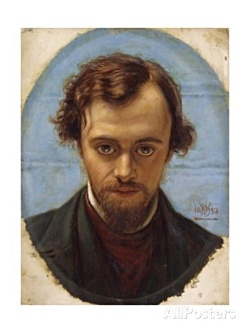 Ik ben Rossetti,’ zegt hij en ik hoor zijn stem vertraagd, alsof hij weerkaatst wordt door een gewelf. ‘Mijn naam is Dante Gabriel Rossetti, u zult wel nooit van mij gehoord hebben. Ik ben dichter en schilder.
Ik ben Rossetti,’ zegt hij en ik hoor zijn stem vertraagd, alsof hij weerkaatst wordt door een gewelf. ‘Mijn naam is Dante Gabriel Rossetti, u zult wel nooit van mij gehoord hebben. Ik ben dichter en schilder.
Er is een beweging, de Prerafaëlitische Broederschap… zo noemen we ons… waarvan ik de leider ben. En nu ik u heb gezien, wil ik u vragen…’
Als een mens ooit werd opgetild van de aarde, dan werd ik het, nu. Ik wist niet wat me overkwam. Maar ik wist wel wat ik nu wilde zeggen…
Ze glimlachte en reciteerde – bevangen, als iemand die onwennig op een bruiloft of uitvaart spreekt en bang is iets verkeerds te zeggen – twee van zijn eigen verzen, uit ‘The Blessed Damozel’:
I’ll take his hand and go with him
To the deep wells of light…
Hij knielde voor haar en kuste haar hand. Het was voor het eerst in haar leven dat een man voor haar knielde. Nu mocht en kon er niets meer gezegd worden.
In de deuropening draaide hij zich om. Ze zat nog steeds op haar stoel, haar ene hand op het tafelblad, blank en haast doorschijnend, als door een Hollandse meester geschilderd. Ze keek over haar schouder naar het beroete raam, dat nauwelijks licht doorliet, en scheen weer onbereikbaar, in haar eigen gedachten verzonken. Was ze zo, of poseerde ze? Wat het ook was, ze deed het goed.
Voordat Dante de deur weer sloot, maakte hij met zachte stem de strofe af:
As unto a stream we will step down,
And bathe there in God’s sight
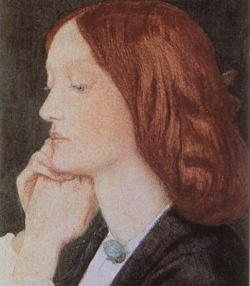 Eva Wanjek:
Eva Wanjek:
Lizzie
paperback met flappen
15×23 cm.
464 pagina’s
ISBN 9789028426160
prijs € 24,95
Uitgeverij Wereldbibliotheek
Johannes Vermeerstraat 63, 1071 DN Amsterdam
Tel: 020 570 61 00
Fax: 020 570 61 99
E-mail: info@wereldbibliotheek.nl
fleursdumal.nl magazine
More in: *The Pre-Raphaelites Archive, - Book News, Archive W-X, Lizzy Siddal, Rossetti, Dante Gabriel, Siddal, Lizzy

Dante Alighieri
(1265-1321)
Death, always cruel
Eath, always cruel, Pity’s foe in chief,
Mother who brought forth grief,
Merciless judgment and without appeal!
Since thou alone hast made my heart to feel
This sadness and unweal,
My tongue upbraideth thee without relief.
And now (for I must rid thy name of ruth)
Behoves me speak the truth
Touching thy cruelty and wickedness:
Not that they be not known; but ne’ertheless
I would give hate more stress
With them that feed on love in very sooth.
Out of this world thou hast driven courtesy,
And virtue, dearly prized in womanhood;
And out of youth’s gay mood
The lovely lightness is quite gone through thee.
Whom now I mourn, no man shall learn from me
Save by the measure of these praises given.
Whoso deserves not Heaven
May never hope to have her company.
“Death, always cruel” was translated into English by D.G. Rossetti (1828-1882)
Dante Alighieri poetry
fleursdumal.nl magazine
More in: Archive C-D, Dante Alighieri, Rossetti, Dante Gabriel
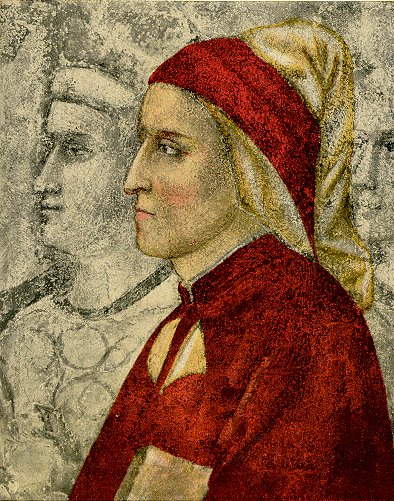
Dante Alighieri
(1265-1321)
Death, always cruel
Eath, always cruel, Pity’s foe in chief,
Mother who brought forth grief,
Merciless judgment and without appeal!
Since thou alone hast made my heart to feel
This sadness and unweal,
My tongue upbraideth thee without relief.
And now (for I must rid thy name of ruth)
Behoves me speak the truth
Touching thy cruelty and wickedness:
Not that they be not known; but ne’ertheless
I would give hate more stress
With them that feed on love in very sooth.
Out of this world thou hast driven courtesy,
And virtue, dearly prized in womanhood;
And out of youth’s gay mood
The lovely lightness is quite gone through thee.
Whom now I mourn, no man shall learn from me
Save by the measure of these praises given.
Whoso deserves not Heaven
May never hope to have her company.
“Death, always cruel” was translated into English by D.G. Rossetti (1828-1882)
Dante Alighieri poetry
kempis.nl poetry magazine
More in: Archive C-D, Dante Alighieri, Rossetti, Dante Gabriel
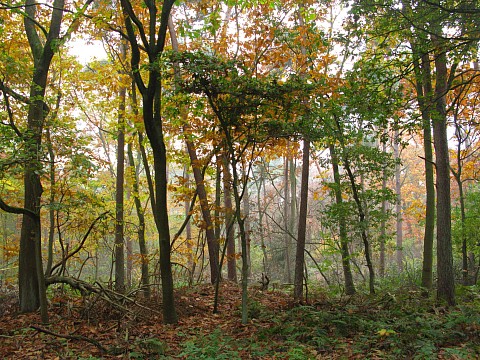
.jpg)
Dante Gabriel Rossetti
(1828-1882)
Autumn Song
Know’st thou not at the fall of the leaf
How the heart feels a languid grief
Laid on it for a covering,
And how sleep seems a goodly thing
In Autumn at the fall of the leaf?
And how the swift beat of the brain
Falters because it is in vain,
In Autumn at the fall of the leaf
Knowest thou not? and how the chief
Of joys seems–not to suffer pain?
Know’st thou not at the fall of the leaf
How the soul feels like a dried sheaf
Bound up at length for harvesting,
And how death seems a comely thing
In Autumn at the fall of the leaf?


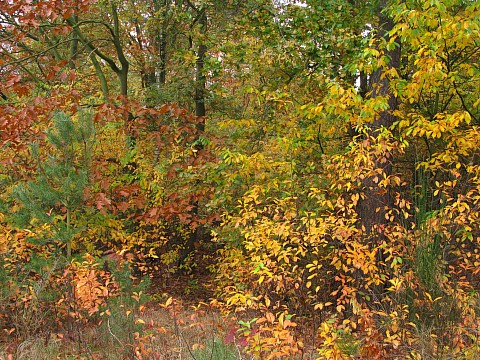
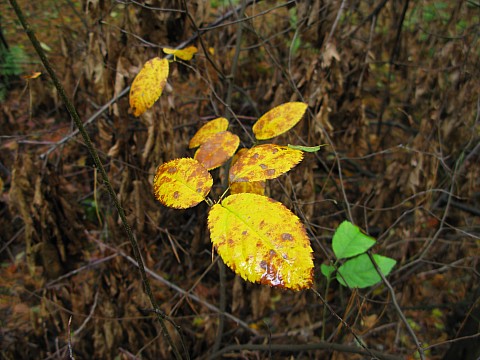
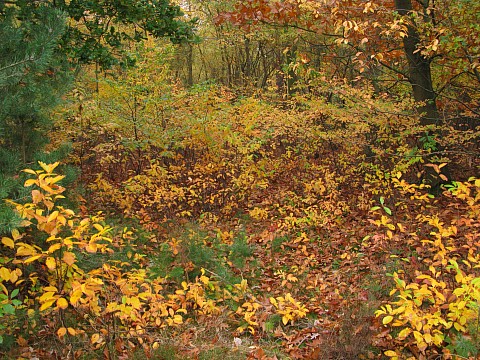



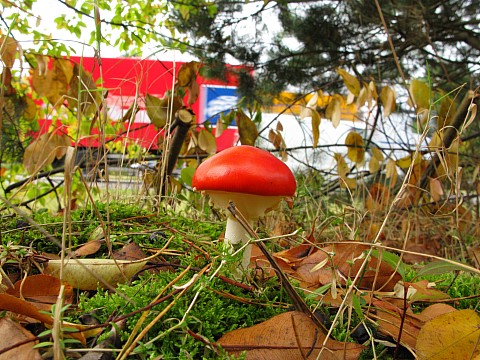
Ton van Kempen photos: Autumn 3
D.G. Rossetti poetry
fleursdumal.nl magazine
More in: *The Pre-Raphaelites Archive, 4SEASONS#Autumn, Archive Q-R, Rossetti, Dante Gabriel, Ton van Kempen Photos
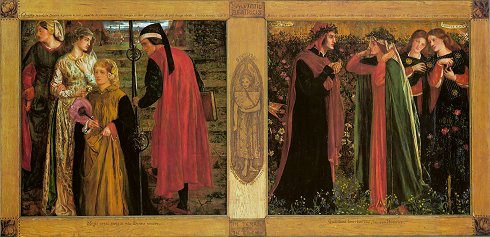
D a n t e G a b r i e l R o s s e t t i
(1828-1882)
S e v e n P o e m s
Insomnia
Thin are the night-skirts left behind
By daybreak hours that onward creep,
And thin, alas! the shred of sleep
That wavers with the spirit’s wind:
But in half-dreams that shift and roll
And still remember and forget,
My soul this hour has drawn your soul
A little nearer yet.
Our lives, most dear, are never near,
Our thoughts are never far apart,
Though all that draws us heart to heart
Seems fainter now and now more clear.
To-night Love claims his full control,
And with desire and with regret
My soul this hour has drawn your soul
A little nearer yet.
Is there a home where heavy earth
Melts to bright air that breathes no pain,
Where water leaves no thirst again
And springing fire is Love’s new birth?
If faith long bound to one true goal
May there at length its hope beget,
My soul that hour shall draw your soul
For ever nearer yet.
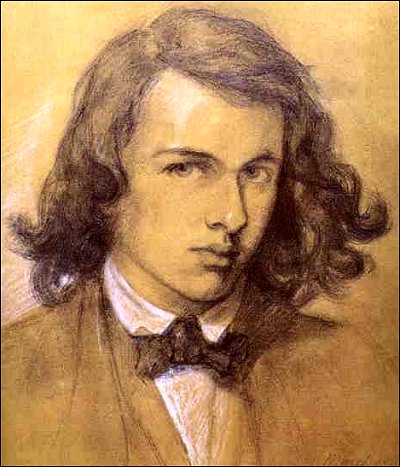
The Portrait
This is her picture as she was:
It seems a thing to wonder on,
As though mine image in the glass
Should tarry when myself am gone.
I gaze until she seems to stir,–
Until mine eyes almost aver
That now, even now, the sweet lips part
To breathe the words of the sweet heart:–
And yet the earth is over her.
Alas! even such the thin-drawn ray
That makes the prison-depths more rude,–
The drip of water night and day
Giving a tongue to solitude.
Yet only this, of love’s whole prize,
Remains; save what in mournful guise
Takes counsel with my soul alone,–
Save what is secret and unknown,
Below the earth, above the skies.
In painting her I shrin’d her face
Mid mystic trees, where light falls in
Hardly at all; a covert place
Where you might think to find a din
Of doubtful talk, and a live flame
Wandering, and many a shape whose name
Not itself knoweth, and old dew,
And your own footsteps meeting you,
And all things going as they came.
A deep dim wood; and there she stands
As in that wood that day: for so
Was the still movement of her hands
And such the pure line’s gracious flow.
And passing fair the type must seem,
Unknown the presence and the dream.
‘Tis she: though of herself, alas!
Less than her shadow on the grass
Or than her image in the stream.
That day we met there, I and she
One with the other all alone;
And we were blithe; yet memory
Saddens those hours, as when the moon
Looks upon daylight. And with her
I stoop’d to drink the spring-water,
Athirst where other waters sprang;
And where the echo is, she sang,–
My soul another echo there.
But when that hour my soul won strength
For words whose silence wastes and kills,
Dull raindrops smote us, and at length
Thunder’d the heat within the hills.
That eve I spoke those words again
Beside the pelted window-pane;
And there she hearken’d what I said,
With under-glances that survey’d
The empty pastures blind with rain.
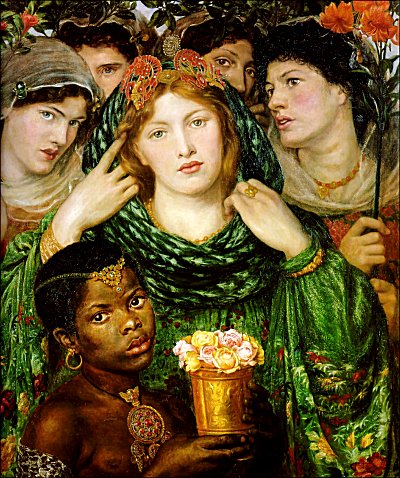
Next day the memories of these things,
Like leaves through which a bird has flown,
Still vibrated with Love’s warm wings;
Till I must make them all my own
And paint this picture. So, ‘twixt ease
Of talk and sweet long silences,
She stood among the plants in bloom
At windows of a summer room,
To feign the shadow of the trees.
And as I wrought, while all above
And all around was fragrant air,
In the sick burthen of my love
It seem’d each sun-thrill’d blossom there
Beat like a heart among the leaves.
O heart that never beats nor heaves,
In that one darkness lying still,
What now to thee my love’s great will
Or the fine web the sunshine weaves?
For now doth daylight disavow
Those days,–nought left to see or hear.
Only in solemn whispers now
At night-time these things reach mine ear;
When the leaf-shadows at a breath
Shrink in the road, and all the heath,
Forest and water, far and wide,
In limpid starlight glorified,
Lie like the mystery of death.
Last night at last I could have slept,
And yet delay’d my sleep till dawn,
Still wandering. Then it was I wept:
For unawares I came upon
Those glades where once she walk’d with me:
And as I stood there suddenly,
All wan with traversing the night,
Upon the desolate verge of light
Yearn’d loud the iron-bosom’d sea.
Even so, where Heaven holds breath and hears
The beating heart of Love’s own breast,–
Where round the secret of all spheres
All angels lay their wings to rest,–
How shall my soul stand rapt and aw’d,
When, by the new birth borne abroad
Throughout the music of the suns,
It enters in her soul at once
And knows the silence there for God!
Here with her face doth memory sit
Meanwhile, and wait the day’s decline,
Till other eyes shall look from it,
Eyes of the spirit’s Palestine,
Even than the old gaze tenderer:
While hopes and aims long lost with her
Stand round her image side by side,
Like tombs of pilgrims that have died
About the Holy Sepulchre.
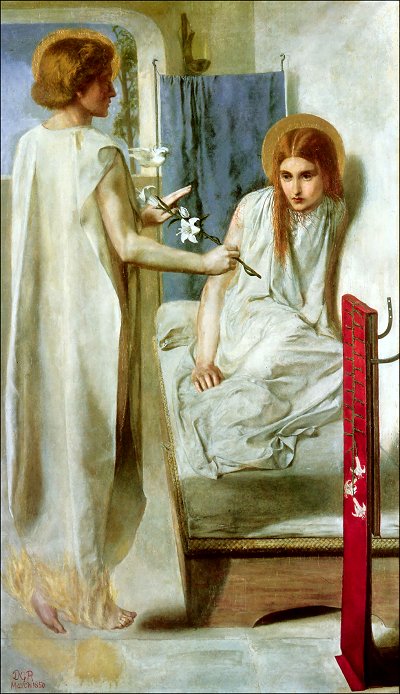
The Kiss
What smouldering senses in death’s sick delay
Or seizure of malign vicissitude
Can rob this body of honour, or denude
This soul of wedding-raiment worn to-day?
For lo! even now my lady’s lips did play
With these my lips such consonant interlude
As laurelled Orpheus longed for when he wooed
The half-drawn hungering face with that last lay.
I was a child beneath her touch, — a man
When breast to breast we clung, even I and she, —
A spirit when her spirit looked through me, —
A god when all our life-breath met to fan
Our life-blood, till love’s emulous ardours ran,
Fire within fire, desire in deity.
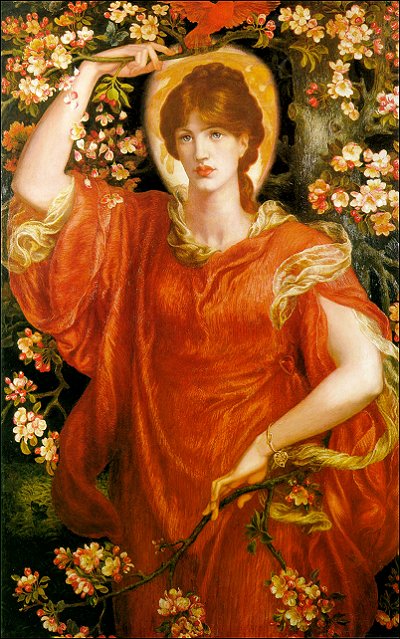
Through Death To Love
Like labour-laden moonclouds faint to flee
From winds that sweep the winter-bitten wold,–
Like multiform circumfluence manifold
Of night’s flood-tide,–like terrors that agree
Of hoarse-tongued fire and inarticulate sea,–
Even such, within some glass dimm’d by our breath,
Our hearts discern wild images of Death,
Shadows and shoals that edge eternity.
Howbeit athwart Death’s imminent shade doth soar
One Power, than flow of stream or flight of dove
Sweeter to glide around, to brood above.
Tell me, my heart,–what angel-greeted door
Or threshold of wing-winnow’d threshing-floor
Hath guest fire-fledg’d as thine, whose lord is Love?
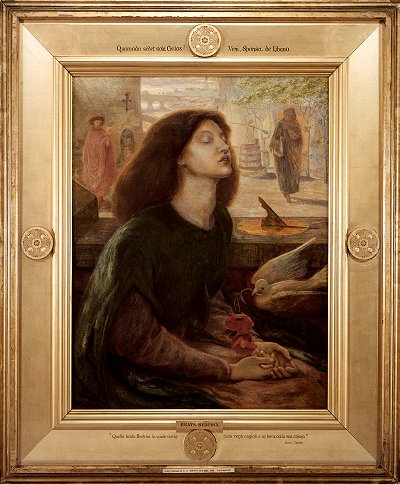
The Gloom that Breathes Upon Me
The gloom that breathes upon me with these airs
Is like the drops which stike the traveller’s brow
Who knows not, darkling, if they bring him now
Fresh storm, or be old rain the covert bears.
Ah! bodes this hour some harvest of new tares,
Or hath but memory of the day whose plough
Sowed hunger once, — the night at length when thou,
O prayer found vain, didst fall from out my prayers?
How prickly were the growths which yet how smooth,
Along the hedgerows of this journey shed,
Lie by Time’s grace till night and sleep may soothe!
Even as the thisteldown from pathsides dead
Gleaned by a girl in autumns of her youth,
Which one new year makes soft her marriage-bed.
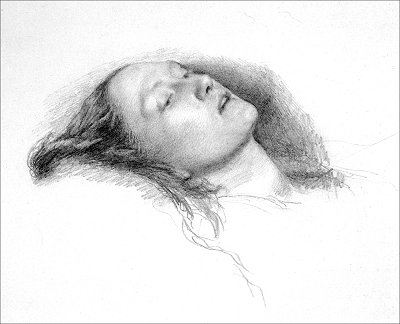
The Ballad of Dead Ladies
Tell me now in what hidden way is
Lady Flora the lovely Roman?
Where’s Hipparchia, and where is Thais,
Neither of them the fairer woman?
Where is Echo, beheld of no man,
Only heard on river and mere–
She whose beauty was more than human?–
But where are the snows of yester-year?
Where’s Heloise, the learned nun,
For whose sake Abeillard, I ween,
Lost manhood and put priesthood on?
(From Love he won such dule and teen!)
And where, I pray you, is the Queen
Who willed that Buridan should steer
Sewed in a sack’s mouth down the Seine?–
But where are the snows of yester-year?
White Queen Blanche, like a queen of lilies,
With a voice like any mermaiden–
Bertha Broadfoot, Beatrice, Alice,
And Ermengarde the lady of Maine–
And that good Joan whom Englishmen
At Rouen doomed and burned her there–
Mother of God, where are they then?–
But where are the snows of yester-year?
Nay, never ask this week, fair lord,
Where they are gone, nor yet this year,
Except with this for an overword–
But where are the snows of yester-year?
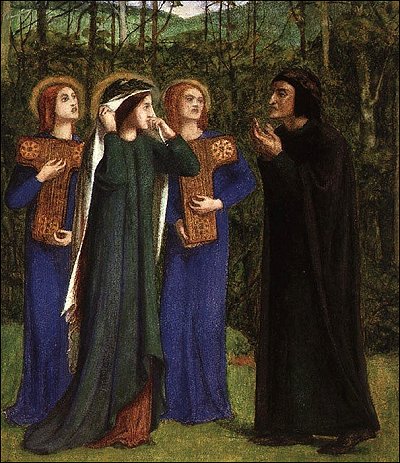
Life-In-Love
| Not in thy body is thy life at all But in this lady’s lips and hands and eyes; Through these she yields thee life that vivifies What else were sorrow’s servant and death’s thrall. Look on thyself without her, and recall The waste remembrance and forlorn surmise That liv’d but in a dead-drawn breath of sighs O’er vanish’d hours and hours eventual.Even so much life hath the poor tress of hair Which, stor’d apart, is all love hath to show For heart-beats and for fire-heats long ago; Even so much life endures unknown, even where, ‘Mid change the changeless night environeth, Lies all that golden hair undimm’d in death. |
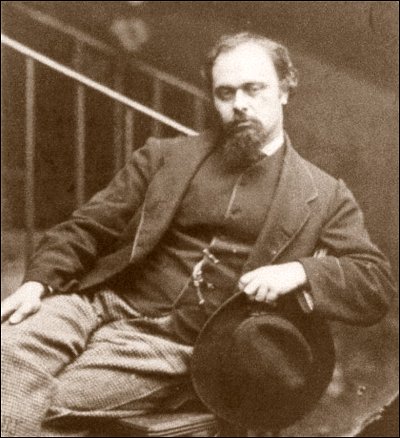
Dante Gabriel Rossetti: Seven Poems
fleursdumal.nl magazine
More in: Rossetti, Dante Gabriel
Thank you for reading Fleurs du Mal - magazine for art & literature